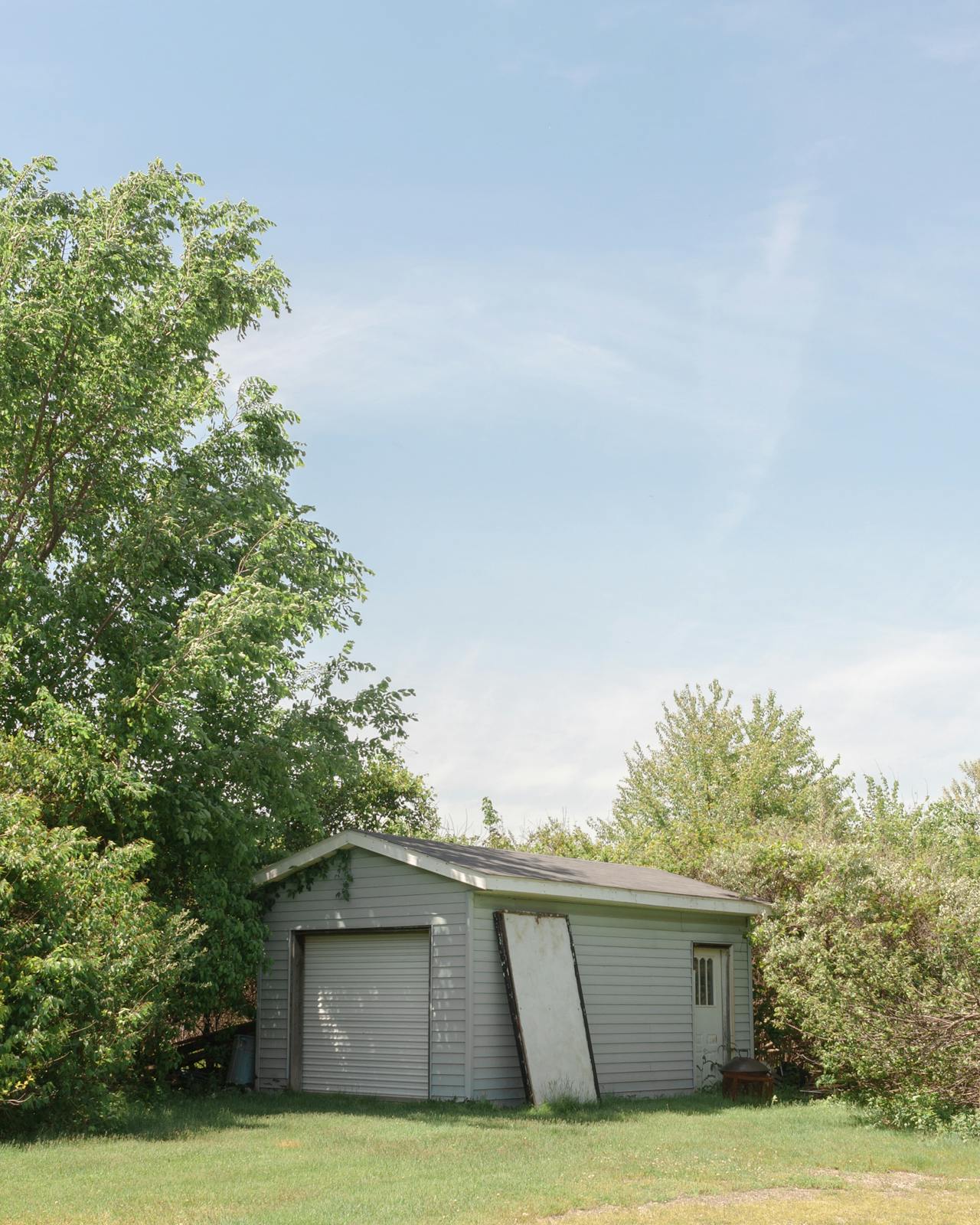Disinfection of linen is an essential part of the washing process because even high temperatures and modern washing powders can not cope with this function on their own. Besides, the use of high-temperature modes during washing is not environmentally friendly.
The laundry can hide pathogens that can cause a spread of different illnesses, including respiratory and skin infections. Most of the bacteria survive the regular wash cycle.
To disinfect linen, you can use specialized products, as well as bleach. However, these items are not suitable in all cases. They can cause an adverse reaction of the sensitive skin or affect the color of the tissue. However, you can try vinegar for the same goals. Does vinegar disinfect laundry? How to use vinegar for disinfection? In this article, I answer these questions and talk about different properties of this substance.
Properties of Vinegar
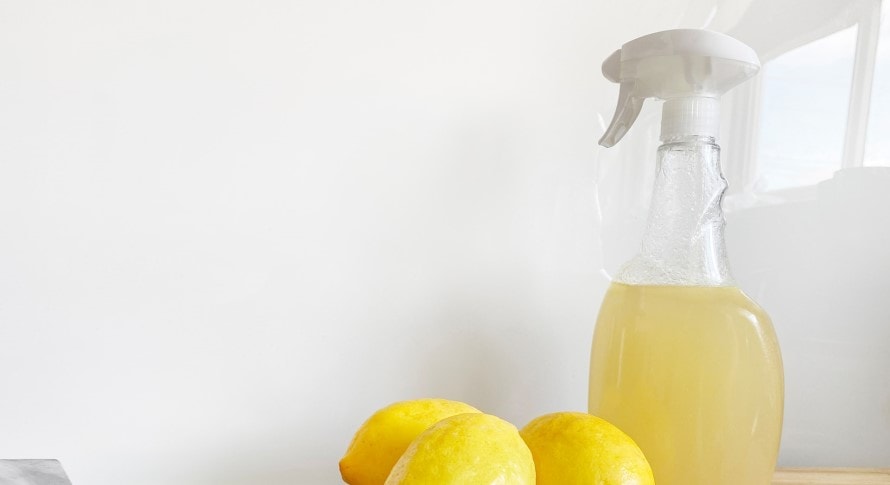
Vinegar has many properties that are useful in the household. One of them is the efficiency in washing clothes. Vinegar works as an excellent stain remover, and it’s excellent for delicate fabrics. But what about disinfection? Does vinegar kill viruses and bacteria? In a word, yes. Vinegar or acetic acid can damage bacteria.
The properties of vinegar as natural laundry disinfectant are not fully understood. However, there are a lot of studies that show its antibacterial effectiveness.
The antibacterial properties of vinegar were tested in minimal concentrations at different exposure times. It turned out that exposure to a 6% solution of acetic acid within 30 minutes effectively kills Mycobacterium Tuberculosis, Staphylococcus aureus, and E. coli. In other words, exposure to acetic acid, in a slightly more concentrated form than vinegar sold at the supermarket, can effectively disinfect. In 2010, the research team discovered that 10% of malt vinegar also kills influenza viruses.
The acetic acid in white vinegar kills bacteria if the concentration is about 5 percent. Acid penetrates the cell wall and destroys bacteria. Nevertheless, it is not as effective against many pathogens as other commercial products made from ingredients that kill bacteria, such as bleach and other bactericides.
Acetic acid destroys the soap plaque, which eventually forms on material after several washes. And the presence of plaque on towels, sheets, and duvet covers can irritate sensitive (especially baby) skin and cause an allergic reaction. Vinegar also helps to neutralize the smell of tobacco or mold. Using vinegar, you can also get rid of:
- Clothes and head lice;
- Dermatomycetes (fungi that affect the skin and nails);
- Bed bugs;
- Dust mites;
- Viruses that have settled on tissue, such as a handkerchief;
- Bacteria that provoke the smell of sweat on clothing;
- E. coli, which is often found on the underwear.
The results of the studies are promising. However, the vinegar is not on the EPA list of certified disinfectants. More research is still needed on different types and concentrations of vinegar.
However, vinegar can be used with other disinfectants. You don’t have to mix them. If you wash in a washing machine, just pour the substance into the softener dispenser. So you will ensure the cleanliness of your laundry and preserve the properties of the fabric. It will save the color and softness.
How to Disinfect Laundry With Vinegar
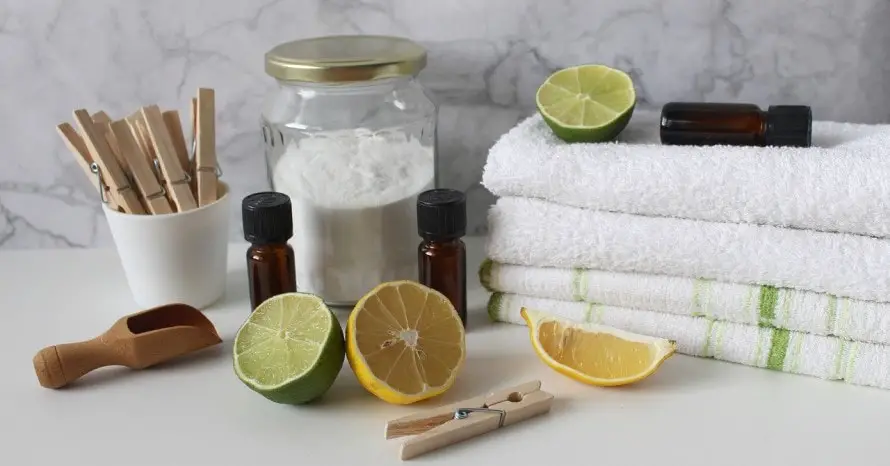
Disinfect laundry with vinegar does not harm either laundry or the washing machine if you use it correctly. The only negative point is the smell of the acid. However, no additional events are needed. It will disappear on its own within a few hours.
Supplies
To use vinegar for disinfection, you can use your washing machine. All you need to do is pour the substance into the softener dispenser or a special softener ball. You can also pre-soak the laundry; for this, you need a basin or any other container that is suitable in size. In order not to be mistaken with the proportions, take a measuring cup. You will need gloves for hand washing.
In some cases, you can boil linen with vinegar: this also has a whitening effect on the fabric. A suitable pan is useful for this procedure. It should fit not only your piece of clothes or linen but also a certain amount of water.
Guide
How to sanitize laundry during the handwash?
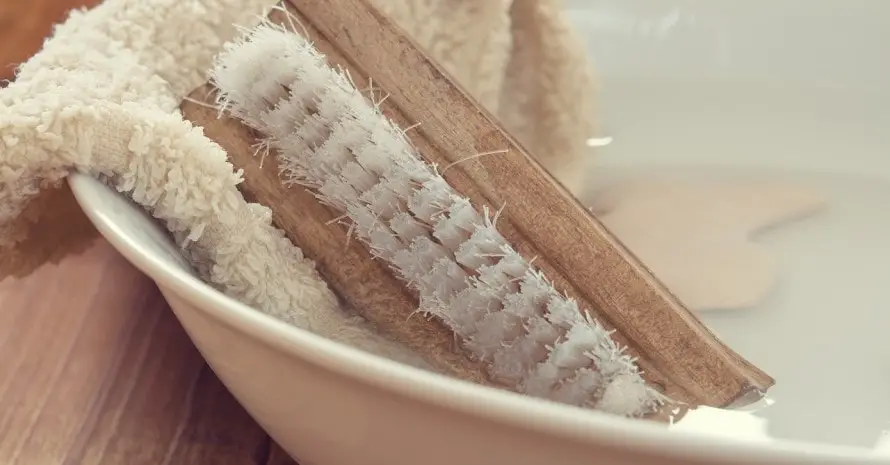
Use it for a similar purpose: to remove stains, soften the tissue and its disinfection. The solution is prepared according to a single recipe: for each liter of water, take one tablespoon of the substance. If fabric sheds much, then the pigment can be fixed by soaking your laundry for 20-30 minutes in cool white vinegar water.
If you also want to remove persistent stains and odor, you can boil your linen and pieces of clothes. It’s an effective way to clean greasy kitchen towels. They are soaked in an enameled basin, brought vinegar water to a boil, and left overnight. In the morning, wash the towels as usual.
There are a few recipes if you are searching how to disinfect laundry without bleach in your washing machine. You can add white or apple cider vinegar to the washing machine. It won’t damage the details. Unlike many washing powders and bleach, the acid delicately affects the “inside” of the appliance. Acid is used to wash white and colored items. Under its influence, colors become brighter; they are not so actively washed out of tissues. With it, you can effectively disinfect, whiten things and remove old stains from them.
How much vinegar in laundry to disinfect?
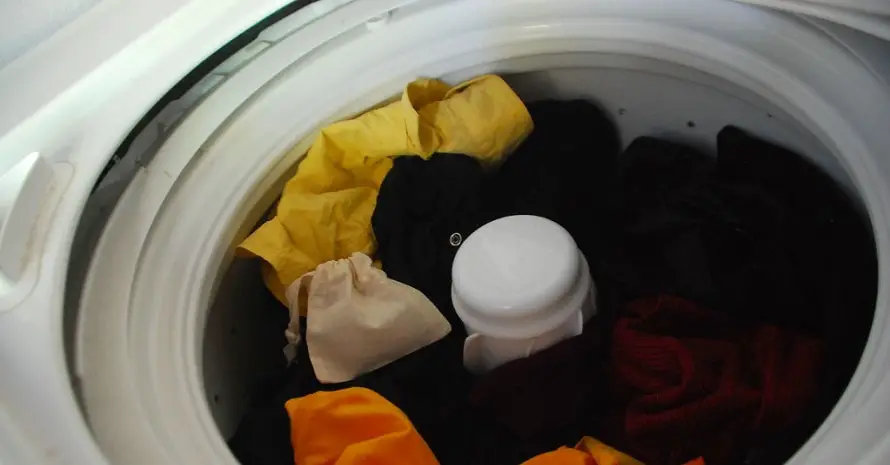
If you use apple cider vinegar, you have to pour one cup of the substance during the rinsing cycle. As for the white vinegar, 3,3 Oz (100 Ml) of acid is enough. Pour it to the softener dispenser before washing. Use ordinary washing powder as a detergent. The sour smell will quickly disappear during drying. In a vinegar solution, you can rinse new things that have never been washed. The lower the water temperature, the better. The substance also refreshes the item, fixes the coloring pigment, and disinfects the laundry.
For tissue disinfection, use white vinegar without adding detergent, pouring it into the desired compartment. Load the laundry and activate the rinse mode. Vinegar disinfects diapers and other things that are used to care for newborns.
There are a few crucial points to keep in mind if you are going to wash with vinegar. Wash with acid on a delicate basis. Vinegar is suitable for every type of fabric. Hand washes with vinegar should be carried out with gloves. To prevent the washing machine from smelling of acid, just leave its door open for 12 hours. At the same time, the bathroom should have adequate ventilation. Don’t use vinegar essence to the washing machine. Take vinegar with a concentration of 9%, but not higher.
Useful Tips
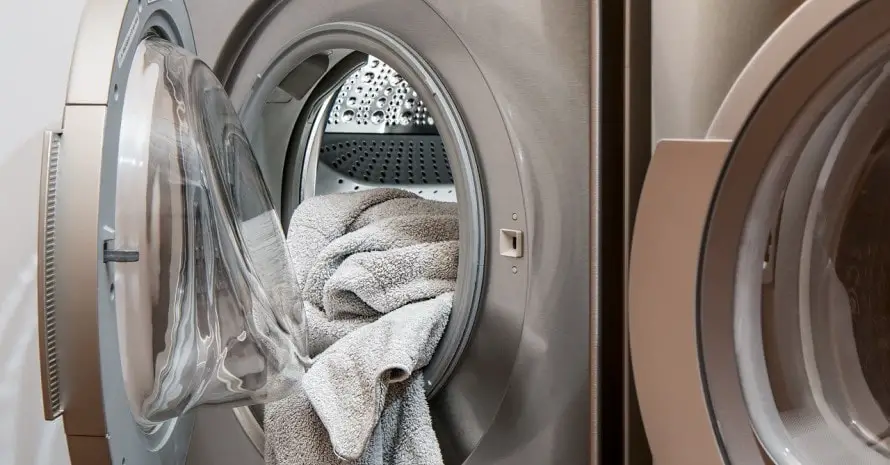
As you know, the answer to the main question, “does vinegar disinfect clothes and other laundry?” it’s time to tell about other properties of this substance. The multipurpose of the given substance is associated with the gentle acid that is part of it. This substance, like citric acid, can clean the required surfaces without harming their structure.
One of the most common areas where you can apply table vinegar is cleaning clothes and other fabrics.
For example:
- Removal of lime stains;
- Removing stains from food;
- Removing stains from dyes;
- Degreasing clothes;
- Whitening.
Applying table vinegar is also a popular way to clean the washing machine itself. It’s no secret that any washing machine gets dirty over time. The first thing you have to face is the formation of scale on the heating element. Later, ordinary dirt accumulates on top of the inside of the machine, which prevents the full cleaning of tissues.
To avoid the washing machine damage, caused by scale and accumulated dirt, you can regularly use white or apple vinegar during washing. It is necessary to carry out “personal cleaning” for it once in 1-2 months. Start the washing mode without laundry and add 5 cups of vinegar.
White bedding, underwear, and bath towels quickly lose their color and get wiped out. To restore them, add 1 cup of white vinegar solution directly to the tank when washing. Before trying to remove old stains in a washing machine, you should apply a small amount of vinegar directly to the stain and wait for several minutes before hand or machine washing.
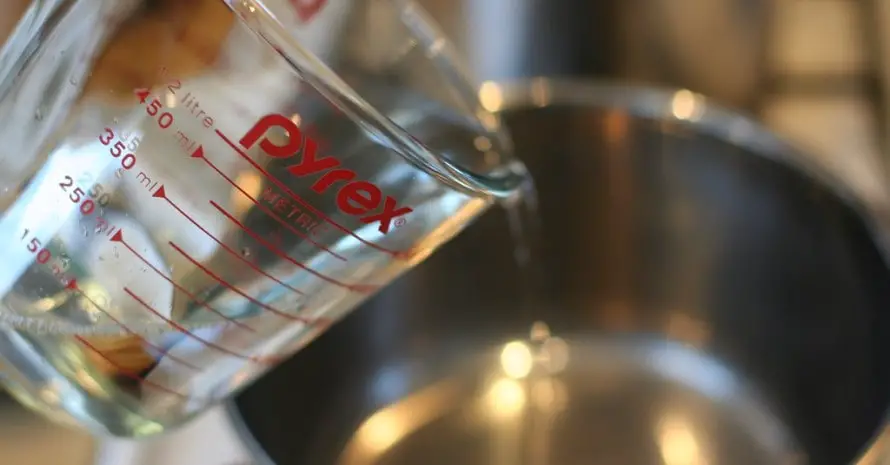
Grease stains from oil, foundation are removed in a solution: 1 liter of table vinegar in 9-10 liters of warm water. After soaking, wash your clothes with the addition of powder. Coffee stains on your favorite blouse, drops of wine, chocolate, cocoa, and jam stains can be removed with an improvised spray. Add one tablespoon of vinegar to a spray bottle and spray the stained area with the product. Leave for 15-20 minutes, then wash.
You can not use concentrated acetic acid, or, as it is also called, acetic essence! Remember that this is a toxic substance that can not only lead to damage to household appliances but also cause serious poisoning to humans.
More concentrated solutions, such as 30% Pure Vinegar, Extra Strength by Harris or 30% Vinegar - 300 Grain Vinegar Concentrate, can be used for the garden and other household needs. In certain proportions, you can use acetic acid as:
- Fertilizer agent
- Soil acidifier
- Slug remedy
- Rodent remedy
- Substance against fruit flies
- For cleaning garden tools
- Pottery cleaner
- Mosquitoes protector
- Growth stimulator
- Cleanser and healing agent
If you already have 30 percent vinegar or something like No products found., you can get 6% or 9% vinegar, which is more suitable for household needs. To obtain 6% vinegar, you need to dilute 1 part of a 30% solution of acetic acid in 4 parts of water. If you need 9% vinegar, you have to mix 1 part of a 30% solution of acetic acid in 2.3 parts of water. The proportions decrease or increase following the concentration of acetic acid.
Substances To Avoid
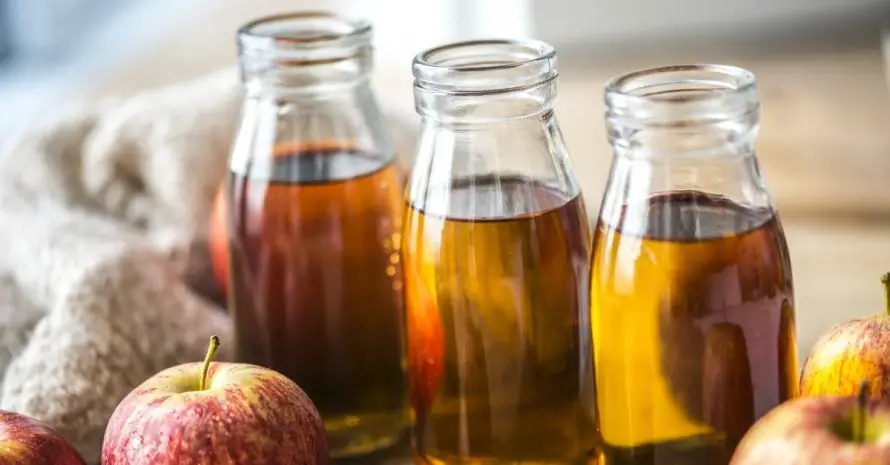
Vinegar can become a reliable assistant in the household. Does white vinegar disinfect laundry? Does apple cider vinegar disinfect laundry? Yes, these types of vinegar can be used for disinfection, washing, and other purposes. However, it would be best if you used 6%-9% vinegar.
Are all kinds of vinegar suitable for these purposes? Avoid using 80% acetic acid concentration. The concentrate itself is a toxic inedible substance used in the industry. It often causes intoxication and severe poisoning.
Several types of the substance also can’t be used for laundry: red wine vinegar and balsamic vinegar. These kinds of vinegar are excellent for cooking. You can prepare a lot of salads and meat dishes with their help. They also have many beneficial properties for your body. For example, adding balsamic vinegar can improve the condition of your skin. Besides, balsamic vinegar is the most fragrant and has a delightful, sweet and sour taste with rich, fruity notes. However, they are quite useless for laundry.
Due to acetic acid, vinegar kills various types of bacteria. This remedy is natural, and therefore, unlike whiteness and other components, it does not harm the skin, in particular, the skin of newborns. You can use vinegar in both hand and machine wash. White vinegar is the most suitable for laundry. Apple cider vinegar also can be used.
I have been using vinegar for many years. Without it, clothes and linen are not so soft, pleasant to the touch, and clean. The substance also helps to get rid of stains, even if they are old. It also cares about your washing machine mechanism and saves the color fabric during the rinsing cycle. All you have to do is to pour it into the softener dispenser. You are welcome to share a piece of advice on different natural disinfectants. Do you use vinegar for laundry disinfection or washing machine care? What vinegar is best to disinfect laundry, in your opinion? Please, leave your comments in the section below.

